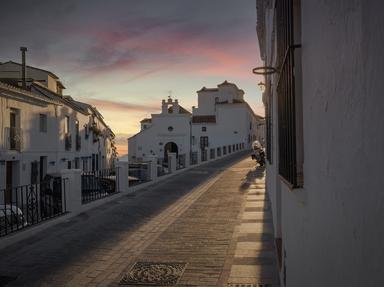Quiz Answer Key and Fun Facts
1. Before the Romans invaded the whole of the Iberian Peninsula, the primitive Galician inhabitants lived in fortified stone towns which are now known as ...?
2. When the Roman Empire fell, barbarian tribes came from Germany and established themselves in the Iberian Peninsula. What was the name of the tribe which settled in Galicia?
3. Galicia was one of the first kingdoms formed in the Iberian Peninsula. In the Middle Ages, much outstanding romantic poetry was produced in the Galician language (called "Galego"), and even foreign kings like Alfonso X (King of Leon) spoke Galego. After centuries, a political manoeuvre unified the kingdoms of "Leon" and Galicia (Creating the first concept of "Spain"). When "Los Reyes Catolicos" ("Catholic Kings"), Isabel de Castilla and Fernando de Aragon married, they decided to unify their kingdoms. They slaughtered Galician nobles and replaced them with foreign aristocrats. Who was the most powerful and best known of those nobles?
4. What happened to the territory in the south of Galicia, which remained free of Spanish rule?
5. In the 19th century, after the war between Spain and Napoleonic France was over, a Galician nationalist movement began to grow. In 1846, a group of young Galician nationalists lead by Antolin Faraldo was killed by Spanish troops. These young men became a legend. What is the name this group received?
6. In the same century, a group of Galician writers that wrote in Galician Language started a literary movement in Galicia called "Rexurdimento" ("Rebirth"). They used Galego in both romantic and epic poems. A female writer was the greatest "Rexurdimento" writer. What was her name?
7. From the 1880s to 1930s, many Galician authors wrote in Galego. In the 1920's a group of young Galician nationalist writers named "Grupo Nos" founded a European avant-garde magazine, which was written in "Galego". Many members of "Grupo Nos" were also politicians, but the most famous of them was not only writer or politician, he also was a painter, dramatist, art critic and doctor. What was his name?
8. In 1936, Fascist troops lead by General Franco started a war against Spanish republic. After winning, Franco declared himself "Caudillo" and proclaimed a dictatorship that lasted almost 40 years. What was Franco's link with Galicia?
9. Manuel Fraga Iribarne (b. Nov 23 1922) has been Galicia's president since 1990. He was the founder of "AP" (later changed its name to "PP"), the conservative party in Spanish, which won year 2000 general election. What was Fraga's political affiliation during General Franco's dictatorship (1939-1975)?
10. Galicia's territory is divided in four provinces. What are their names?
11. Galicia has always been a poor country. Many people emigrated to other lands in search of fortune, mainly to South America - and specially to ...?
12. Galician folk music reflects this nation's Celtic heritage, so pipes are a very popular instrument. What is the Galician name for this instrument?
13. An important genre in Galician popular music is basically a "duel of wits" between two singers, who improvise clever rhymes to insult each other. What's the name of this practice?
14. In the mid 1990s, many young Galician music bands started mixing Punk Rock, Ska and Folk and created a new music genre. What was it called?
15. In November 2002, a ship carrying oil sank near the Galician coast. This was the biggest natural disaster in Spain's history. What was the name of that ship?
Source: Author
Yoritomo
This quiz was reviewed by FunTrivia editor
bloomsby before going online.
Any errors found in FunTrivia content are routinely corrected through our feedback system.

